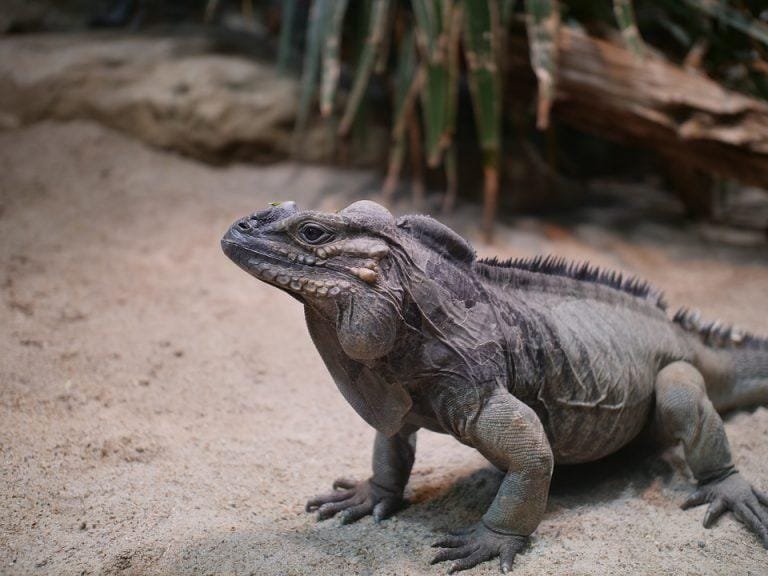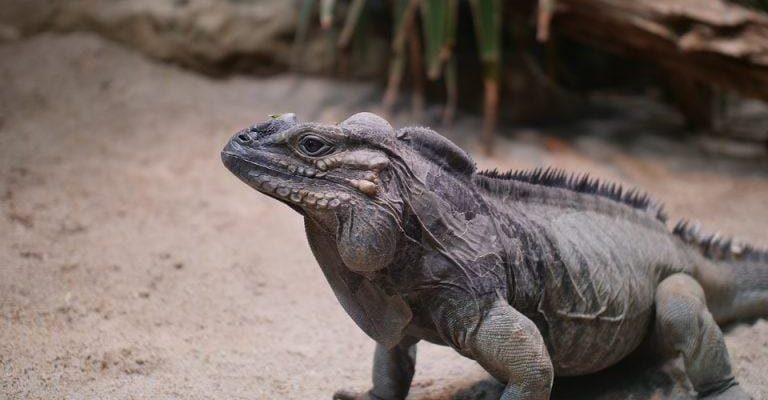
Rhino Iguanas are not just a pretty face; they come with their own set of quirks and needs. Much like caring for a plant that requires a special type of soil and sunlight, owning a Rhino Iguana demands time, effort, and knowledge. If you’re considering this species as a pet, it’s essential to understand both the appealing aspects and the challenges that come with them.
What Is a Rhino Iguana?
The Rhino Iguana, scientifically known as *Cyclura cornuta*, is a large lizard native to the Caribbean islands of Hispaniola and surrounding areas. They get their name from the distinct horn-like structures on their snouts, which resemble rhino horns. These lizards can reach lengths of up to 5 feet and can weigh over 10 pounds. They’re known for their rugged appearance and calm demeanor, making them intriguing pets for those who appreciate reptiles.
Here’s a fun fact: Rhino Iguanas have a lifespan that can reach 20 years or more in captivity. This means that adopting one isn’t just a short-term commitment; it’s a long-term partnership that requires thoughtful planning and care. You’ll need to get your habitat ready, gather the right diet, and create a nurturing environment that keeps your iguana happy.
Do They Require Special Care?
Absolutely, and here’s the thing: Rhino Iguanas are not your typical pet. They have specific needs that must be met for them to thrive. First off, they require a spacious enclosure—at least 4 feet long—because they like to roam around. A terrarium with proper ventilation, UVB lighting, and a temperature gradient is essential. This setup mimics their natural habitat and helps with their overall health.
Diet is another critical factor. Rhino Iguanas are vegetarian, so you’ll need to provide a variety of leafy greens, vegetables, and even fruits. Think of creating a salad bar, where they can munch on collard greens, dandelion leaves, and squash. Avoid feeding them processed foods or high-fat items, as these can lead to health issues.
Maintaining humidity levels in their habitat is vital too. Using a water dish or misting the enclosure can help mimic the humidity of their natural environment. If you’re wondering how to achieve the right balance, a hygrometer can be a handy tool to monitor humidity levels.
Socialization and Handling
You might be concerned about how social these lizards are. Rhino Iguanas can be friendly and even affectionate with proper handling and socialization. However, it’s essential to start slowly. As a beginner, you might feel a bit nervous handling your new pet. Remember, patience is key!
Begin with short interaction sessions. Allow your iguana to get used to your presence before attempting to hold it. Once it’s comfortable, you can gradually increase the time spent together. Over time, you’ll likely find that your Rhino Iguana enjoys your company, but don’t be surprised if it prefers to do its own thing sometimes. They’re not lap pets, after all!
Be aware that every iguana has its personality. Some may be more curious and open to handling, while others might be shy. Respect their comfort zone, and you’ll build a trusting friendship over time.
Common Health Issues
Just like any pet, Rhino Iguanas can face health challenges. Some common issues include metabolic bone disease, respiratory infections, and skin problems. A balanced diet rich in calcium and vitamin D3 is crucial for their bone health. It’s similar to how humans need a good mix of nutrients to stay healthy—too much of one thing or not enough can lead to problems.
Regular veterinary check-ups are also important. Finding a vet who specializes in reptiles will ensure your Rhino Iguana receives the best care possible. You might be wondering how to recognize when your iguana isn’t feeling well. Look for signs like lethargy, changes in appetite, or unusual behaviors. Swift action can often prevent small issues from becoming major problems.
Another aspect to keep in mind is their shedding process. Iguanas will shed their skin as they grow. This can sometimes lead to skin irritations if not monitored. Ensuring proper humidity and providing a rough surface will help them shed more comfortably.
Are They Suitable for Families?
If you have kids or a busy household, you might be curious if a Rhino Iguana can fit into your family. Generally, they can be suitable, but you’ll need to take some precautions. Young children may not understand how to handle them gently, leading to stress for both the iguana and the little one.
Supervision is key. Teaching children about respecting personal space and how to engage with the iguana can foster a positive relationship. Encourage them to observe rather than handle the iguana until they are older and understand how to be gentle.
Another consideration is the daily time commitment. These lizards require attention, but they are more independent than some other pets. If you teach children responsibility and involve them in care routines, they can grow to appreciate and understand their unusual pet.
Alternatives to Rhino Iguanas
If you’ve weighed the pros and cons and feel that a Rhino Iguana might not be for you, that’s completely okay! There are plenty of other reptiles that might be better suited for beginners.
Consider the Bearded Dragon. They are friendly, often enjoy social interaction, and are easier to handle. They thrive well in a smaller space compared to Rhino Iguanas and may be a good fit for families.
Another alternative is the Leopard Gecko. These smaller lizards are relatively easy to care for and adapt well to various environments. They have a gentle temperament and don’t require as much space as larger reptiles.
Final Thoughts: Is a Rhino Iguana Right for You?
If you’re still asking yourself, “Is the Rhino Iguana a good pet for beginners?” the answer largely depends on your commitment and the environment you can provide. They require time, space, and knowledge, but they can also offer unique companionship.
Before diving in, consider all the aspects we’ve discussed, from habitat requirements to diet and socialization. If you’re ready for the challenge and excited about building a bond with a fascinating creature, adopting a Rhino Iguana could be a rewarding experience. Just remember to do your research, prepare adequately, and, above all, enjoy the journey of finding your new scaly friend!

